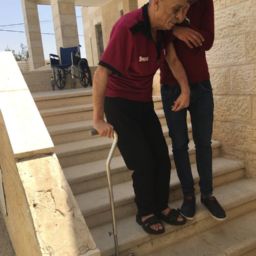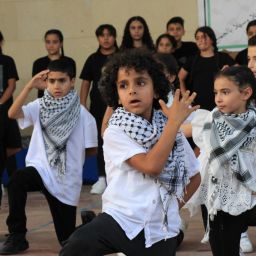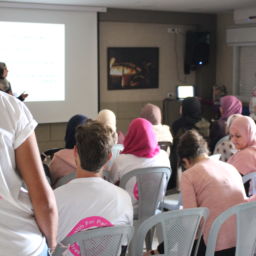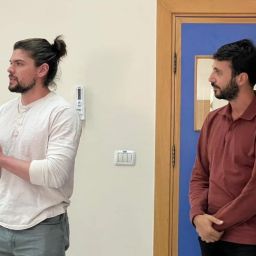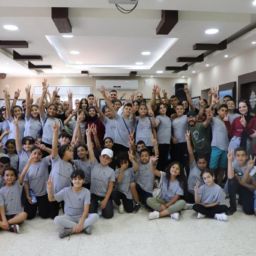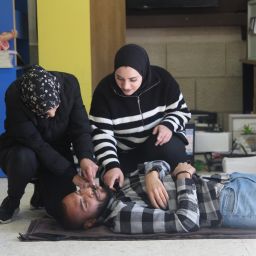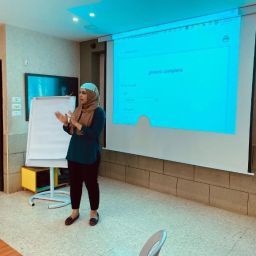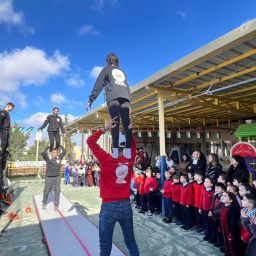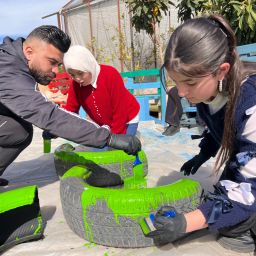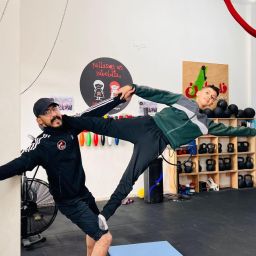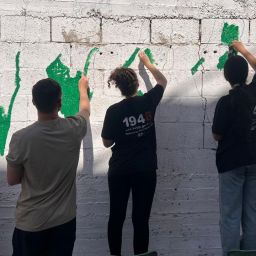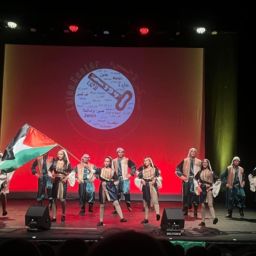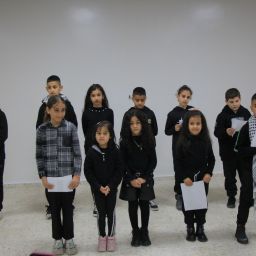Zahrat Al-Yasmeen Kindergarten
The number of children for the 2024-2025 school year is fifty, divided into two classes. In KG1, there are twenty-six children, with thirteen boys and thirteen girls. In KG2, there are twenty-four children, with ten boys and fourteen girls. Seven new children enrolled in KG2 who were not in the kindergarten the previous year.
The school year started on Monday, September 9 2024, where the children were welcomed with joy and love. During the first week, efforts were made to break the barriers between the children and the teachers, as well as among the children themselves, through various activities organized by the teachers. Classroom rules and routines were also established for the children.
The school day begins at 7:30 AM and ends at 12:20 PM, divided into activities and a fixed daily program inside the classrooms. The teachers work on developing the children’s social, psychological, academic, and educational skills throughout the day, and the children are divided into small groups for focused work.
Lajee Library
Five different activities were carried out for a group of children aged five to nine years old. These included educational games, a space for drawing and coloring, and concepts and terms such as (inside/outside), (empty/full), (day/night), and (few/many).
We also touched on the concept of freedom, discussing what the word “freedom” means to children and what symbols represent it. One child said that freedom, to him, means seeing the sea; another said that freedom is when no one controls us. Another child mentioned that in Palestine, there is no freedom because of the Occupation: “We can’t go to the sea or travel because there are restrictions imposed on us by the army.” Symbols like the hand grasping the flag, the dove, and the Palestinian flag were also discussed.
Creative Writing
There were four creative writing sessions this month, focusing on the idea of storytelling, how to narrate a story, its contents, and examples from previous stories to provide the group with more ideas and inspiration for weaving and writing their own stories.
Meeting of the Protection Team
The meeting focused on the importance of monitoring violations related to children’s rights, child arrests, and the local elections for the National Secretariat of the Palestinian Children’s Council in the Bethlehem Governorate.
The winners were:
- Bisan Muneer / Tuqu’
- Malak Du‘amsa / Lajee Center
- Issa Qaisi / Beit Jala
Lajee Music Institute
Music students continued their instrumental and theory lessons with their teachers and took exams to assess their levels.
There were four meetings this month with the choir teacher, Yasmine Al-Atrash, where the children learned musical rhythm, singing techniques, and vocal exercises. The following songs were taught during these sessions: “Yalla N’ammer Ya As’habi Byout Saghira Fi Watana”, “Meel Ala Baladi”, “Lan Naskut Lan Nastaslim”, and “A’toona At-Tufula”.
Health Unit
This month, community health workers made 116 visits to various patients suffering from chronic diseases (hypertension and diabetes), with a total of 131 patients from Aida and Al-Azza camps.
During these home visits, the health workers measure blood pressure, blood sugar levels, and other vital signs like oxygen levels and heart rate. They also ensure that patients take their medications at the correct doses and times, as prescribed by Dr. Mohamed and Dr. Henry. Additionally, they continuously monitor the patients’ progress, follow their specific dietary plans, and actively listen to them, which often extends the visit time to an hour or more. They also observe the psychological, social, and economic impact of the war on the patients. They continue to visit patients who have previously experienced health setbacks and intensively follow up on their cases, adjusting medications when necessary and creating plans to improve their health.
The number of visits was increased for patients with Stage 1 and Stage 2 hypertension and diabetes this month, working to control these cases by providing the necessary medications, adjusting their diets, and referring them to exercise at the Lajee Center gym. We visit these patients to offer psychological support alongside monitoring their health.
An emergency case in Al-Azza camp was handled and transferred to the Arab Society Hospital for tests with the help of Dr. Mohamed. The patient’s condition was monitored and followed up with through home visits.
Environment Unit
- Harvesting parsley and distributing it to patients.
- Daily monitoring of water levels, acidity, and ensuring sufficient availability of nutrients for each water system.
- Watering the external flowers and crops.
- Spraying the greenhouses with soap and alcohol for disinfection.
- Reusing plastic cups and preparing them for planting.
- Monitoring and inspecting the water towers after distributing them to patients, adding fertilizer to the crops, and repairing motors that required maintenance.
- Sowing parsley, lettuce, and spinach seeds for planting in the water systems, with some distributed to patients for planting in their water towers.
- Cleaning the greenhouses and washing the floors with water.
- Recycling wood to create a chair and table.
- Distributing parsley seedlings to patients with water towers.
- Installing supports for cucumbers to secure and hang them.
- Removing damaged seedlings from the systems and cleaning them.
- Cleaning the NFT (Nutrient Film Technique) system and the NFT table system.
- Preparing the green wall system on the center’s roof and planting onions in it.
- Working in the third greenhouse at Abu Sha’ira’s house, disinfecting it, and planting green onions.
- Preparing cups by drilling holes in them for planting.
Women’s Unit
The unit held two meetings during the month:
- September 12: A meeting for the Women’s Unit attended by nine women. The session focused on continuing the preparation of a Palestinian cookbook featuring recipes from the women in the unit. The meeting included four Palestinian dishes: Tabouleh salad, Fattoush salad, Freekeh soup, and Palestinian Ka’ak (cookies).
- September 19: A meeting for the Women’s Unit attended by five women. The session continued the preparation of the Palestinian cookbook, including dishes like Mulukhiyah and Shishbarak.
Rebel Circus School
In September, the circus groups at the Rebel Circus School continued their training sessions. Each group focused on developing various circus skills, with regular practice and guidance from the trainers.
Dabka Unit
In September, training sessions continued for the various dabka groups, and registration opened for children aged six and seven. A total of thirty new children were enrolled to join the young dabka group.


